How to go to Germany to study and work on the example of my emigration
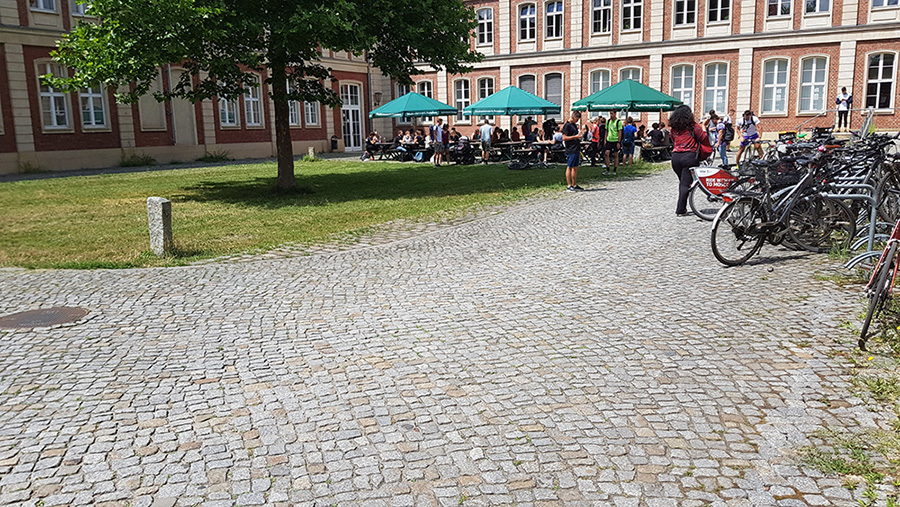
The idea of moving to Europe captured me for many years, but most of all I felt this desire when I was in Berlin for the first time in my life — still a tourist. At one point, I made a decision: I want to live, study and work in Germany.
I have always been much interested in information technology, but did not have a specialized education in this area. Programming is not my thing; I have always been attracted to several other competencies: management, analytics, design, project management.
And, you know, I did it all! Today I will tell you the details of my journey to Germany, about the peculiarities of the German student life, about my studies and about the changes that have occurred in my life thanks to this momentous event.
In Moscow, I finished five years of specialty of a small private university, and the specialty "linguistics", and immediately realized that a career in this specialty is not done. The knowledge gained was not profound, except for knowledge of languages. I have always liked the field of information technology, but I did not have professional knowledge in this field, although I was constantly engaged in self-education (including, I read a lot of habr, reddit, I looked at profile topics on youtube).
')
German courses in Germany
I studied German in Moscow for several years, but it was not enough for me to study at university. To enter the university in Germany, first of all you need to know German not lower than C1 level.
Having learned that it is possible to complete annual language courses immediately in Germany, I began to study this topic in more detail. Great opportunity: learn the language and feel the country more deeply, having lived there for a year.
One Russian-language firm, whose head office is based in Germany, helped me in the search (there are quite a lot of such companies on the market). Yes, of course, I could find courses and get my own, but minimizing the risks in obtaining a visa attracted me too. I turned to intermediaries, and I will not say that I regretted it. They took over all the "paper" work.
I stopped at intensive German courses, for which I needed an initial level of B2, which was exactly what I had at that time. The program is 20 hours a week and 200 euros per month. There is an opportunity to enroll in courses and those who do not have knowledge of German. Groups for them too!
At the embassy, I was issued a national visa "to prepare for university studies" for 3 months. During this period, already in Germany, I received a residence permit with the right to attend courses for one year.
The courses were very cool! Professional native speakers taught, there was always a very positive atmosphere. There were a lot of guys from around the world. I studied in different groups, from 8 people to 17.
And, most importantly, I already lived in Germany! For the first time, it took several thousand euros: I did not immediately find a home for a reasonable fee, the country was still unfamiliar to me. In addition, I had to make a deposit with 8,000 euros in the account, this is a requirement for obtaining a visa. Withdraw from the account there is a possibility of no more than 650 euros per month.
The parents helped, but I knew that the investment would pay off over time. In financial terms, it was hard in the first year.
After completing the course, my German level was already C1. This allowed to think about the beginning of the path to the German bachelor degree. For those who start from scratch, there is an opportunity to study on courses and for the second year, a residence permit is extended without problems.
Admission and study at the university
I used the Uni Assist system, it is centralized for the whole of Germany. I sent my questionnaire to the universities, and almost immediately received confirmation of several of them. No entrance exams, come and sign up right away.
It played into the hands that I had completed a specialty in Russia, although not according to my chosen profile. If he did not exist at all, he would have had to go through a preparatory program for the university during the year. The presence of at least some higher Russian education turned out to be a huge plus.
I decided to stop at the bachelor degree at the University of Potsdam with a degree in Business Administration. There it was not important that my Russian specialty is in no way related to the subject area. In addition, the University of Potsdam is the best that I found near Berlin, because I really liked it here.
I immediately extended the residence permit for three years, and I became a student in Germany. It was a completely new level for me. By the way, an account with blocked funds was no longer needed.
The specialty Business Administration captured in the literal sense. Education is conducted in German, it is interesting to study. Many subjects from the field of project management, IT-management. Today, without IT, any business is not a business. The training is very modern. German education is aimed at obtaining the knowledge that is needed today and will be needed tomorrow.
And the most important feature: you can independently form your curriculum, take as many hours as it is convenient. There are different disciplines, in each indicated a certain number of lectures, seminars, practical exercises. Examinations are not complicated, most often tests and written works, less often oral. Nobody writes off, and why engage in such nonsense, because everyone wants to get knowledge. There are subjects for which the preparation and protection of a thematic project is an exam.
You can go through all the items for 3 years, and you can stretch up to 6 years. By the way, both Germans and Europeans in general, very often do just that. Student life is not only learning, but also many activities, travel, actively spent years of life. For Europeans, it’s not too late to start learning at the age of 30 and 40. I started much earlier, and I do not hurry, I take few courses so that I have enough time for everything with a reserve.
The university provides an opportunity to meet with interesting people, including professors with academic degrees. Any teacher is first of all a mentor, and over time also a colleague. Outside the university, many of them continue to do business and work in large companies. I love very much, when I am invited to various events, these are even better opportunities to make new acquaintances. For example, this year alone I attended the d10e conferences and BlockShow Europe, in the past four more.
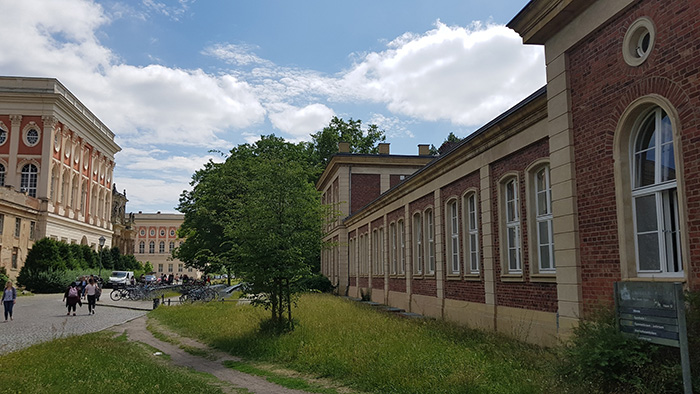
The campus of my university is modest enough by European standards (I was at other universities in Germany and in the Netherlands), but very cozy. Studying here is comfortable.
Student bonuses
Medical student insurance costs 90 euros per month. It does not cover some of the dental services, but otherwise covers absolutely everything. Working people in Germany pay more, but have exactly the same insurance.
This is not like in the United States, when insurance is a hundred types, the majority may not cover half the medical services at all, and for the rest you will have to pay a part of the cost. In Germany, everything is simple and clear (I can’t say about other European countries, I will be glad if you write in the comments).
My German classmate was undergoing treatment for depression, which was fully covered by insurance. He did not like apathy and a periodic nervous state, and finally decided to consult a doctor. The Germans are generally very closely monitoring their health, turning to doctors for any "little things." As in the case of my classmate, not every person from the countries of the former USSR would have thought that this was depression, and not “there is simply no mood.”
For the university itself, I pay 290 euros every six months, this is a mandatory semester fee. But I have Studierendenausweis. Gives you the opportunity to get discounts on entry to museums and some other places. But the most pleasant thing: it gives completely free use of all public transport in Berlin and the land of Brandenburg. This applies to buses, subways, and trains (except high-speed). I can travel to Poland for free.
In general, I really like everything. The attitude of the university and the country itself to the students is excellent. All for a man - just learn.
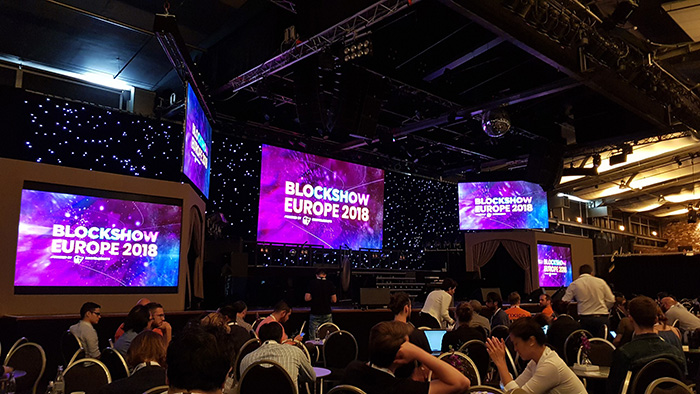
Attending business conferences and other events is part of student life in Europe. If you dream of your startup - these are the best places to find like-minded people and investors. BlockShow 2018 was just unreal cool.
the cost of living
I live in Berlin. For an apartment I pay 630 euros for two rooms, together with electricity and the Internet. I almost always add people to my room (the second room), then it turns out to be two times cheaper. Sometimes, if there is an opportunity to leave for more than a week, I rent my half of the apartment too. Everything is agreed with Vermieter, the retake in my case is allowed. The most important thing is that no one should make noise and cause inconvenience to neighbors.
In the house all the apartments are rented. The house in the center of Berlin is a long-term rental contract, which is why it is very near its shore (there are laws prohibiting raising the value of the contract by more than a certain% per year). Now for such a price with such an arrangement it is difficult to find accommodation.
Theoretically, I could find accommodation in Potsdam, but I like Berlin. A very nice city, where life is in full swing, many events and excellent transport accessibility. To the university the road takes an hour one way (metro + train), but, fortunately, is completely free.
On food takes an average of about 300 euros a month. Many will say that it is a lot, others - that it is not enough. In my opinion, for Berlin is quite reasonable.
I travel a lot, so this is also my expense item. Then how lucky. Spending is mainly on local transport in travel countries, since I choose the cheapest flights from lowcosters, and I use couchsurfing for housing. This, among other things, is the best opportunity to find great acquaintances in different countries. I have opened trips throughout the Schengen area - a student residence permit replaces a visa.
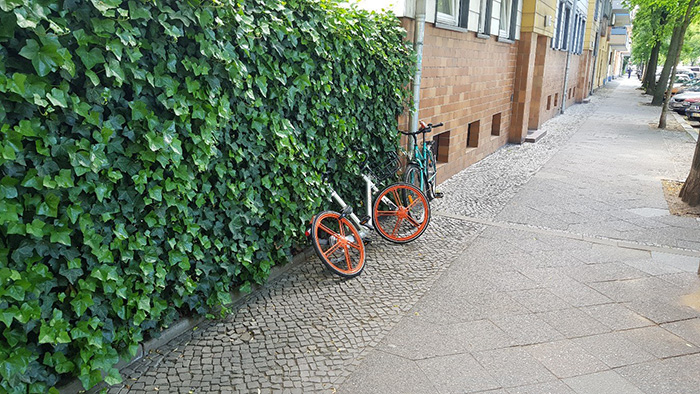
Photo near my house. Cozy, like everywhere in Germany. The best form of urban transport in Western Europe is a bicycle. Residents of Germany and the Netherlands (in particular) - love bicycles very much, and I loved. Movement is life.
Job
Students in Germany are not eligible for a full-time full-time job for more than six months a year. You can work fully for six months, or do part-time jobs no more than 20 hours a week.
But in the full-time job there is no time, so I actively use the second method. There is a lot of work for such employment, there is a qualified one, there is also an unqualified one. But 20 hours a week of qualified work is about 1000 euros per month after taxes. I fully provide for myself.
The last place I did part-time jobs was a company involved in production support and localization of mobile and console games. They needed a person with knowledge of three languages: Russian, German and English.
As a result, it turns out to study and work and travel, and there is still time to develop personal projects. I am actively discussing some of them with university lecturers; their interest in student success is enormous.
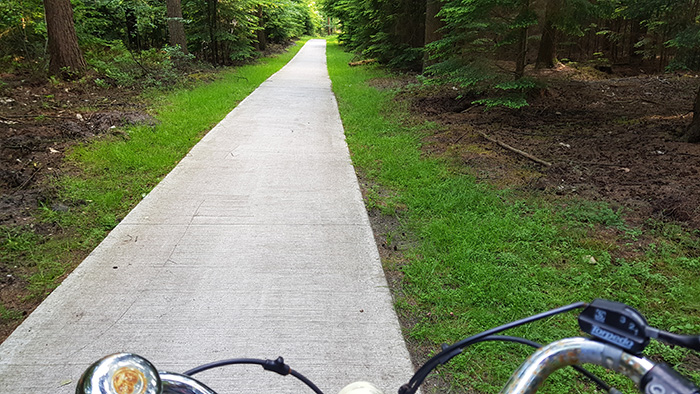
By the way, riding a bicycle to work is very nice. In Western Europe - the norm of everyday life. I thought what photo to pick up, and chose it :) City bike paths and so everyone saw, they are unlikely to surprise anyone. And how do you long distance? The photo was taken not in Germany, but in the Netherlands, I really liked the bike lanes network, stretched between cities. In Germany, such projects are only being developed.
How is it to live among the Germans?
In my opinion, if you want to link the future with a particular country, then you need to try to integrate as much as possible. This is the key to success. Know perfectly the language, communicate a lot and try to establish friendly relations with the locals.
I really want to become a full-fledged German. You will be surprised, but I even changed my name (mine was too difficult for Western Europeans to understand, it was even difficult for them to pronounce it correctly). I notice that I already sometimes started thinking in German and in English. The languages that I use in everyday life are fully German and English.
According to my observations, not all visiting guys easily find contact with the indigenous Germans. Most often, they mostly communicate either in a Russian-speaking environment or in an international non-Western European, where you can meet both Chinese, and Spaniards, and Chileans, and Brazilians. Making friends with Western Europeans (and Germans in particular) is for some reason a rarity. But I, fortunately, succeeded.
(by friendship, I mean precisely close friendship, when they spend a lot of time together, go on family holidays, city events, travel, help each other if necessary)
By the way, international dating is very cool to find at couchsurfing meetings. And the study at the university itself is more than half international.
Changes in yourself after five years of living in Germany
My life has changed dramatically, the way of thinking, behavior, talk - everything has become different. There was a different value system.
There are many plans for the future, including very ambitious ones. In the near make Working Holiday in New Zealand and Australia.
Began to think about the environment. Everyone knows about the sorting of garbage in Europe, about the closure of toxic industries, about the trends to the crowding out of personal vehicles. The fact is that the Europeans are really very concerned about the environment, this is no “initiative from above”. Even courier firms seek to win customers, saying in advertising that they care about the environment, and all their couriers are cyclists. I have a girlfriend from Switzerland who pays voluntary contributions for harmful emissions on the website of the special fund whenever she flies an airplane, but she avoids using the plane, replaces it with a bus or train.
I loved skiing in Norway in winter, I loved hiking in summer, I loved a bicycle as the main mode of transport in the city. Very fond of nature, has become much more active. There were thoughts to become a vegetarian in the foreseeable future.
Loved a lot of photography, writing articles about travel, even developing a project on this topic. I like to share my experience with other people, I want to treat all people as friends.
Speaking in Russian, I automatically began to insert English-speaking words and phrases (even now I wanted to say: “I fell in love with cross-country skiing in winter in Norway, I loved hiking in summer”). By the way, for the German language such penetration of English words is normal and happens all the time.
Began to pay attention to the infrastructure for people with limited mobility everywhere. In general, I began to pay attention to how different states care about the most vulnerable and vulnerable categories of residents.
He began to look more closely at the mentality of people. Western Europeans, Eastern Europeans, Southern Europeans, residents of the United States, residents of the former USSR, residents of China, residents of other countries in Asia and other parts of the world are all very different. But some of the characteristics even in different nations can be very well identified, positive and negative. The study of cultures is my great interest.
He began to smile a lot. He has become much kinder to people, to greet strangers and to wish a good day just by chance. And I myself have nothing better than hearing a good day from the seller in the bakery in the morning.
I began to understand that my main need for life was constant development.
I feel that I have found myself. And I wish everyone the same: find yourself in life!
The article for Habr was prepared by Chris The Rebel (Vladimir Adoshev)
Source: https://habr.com/ru/post/422121/
All Articles